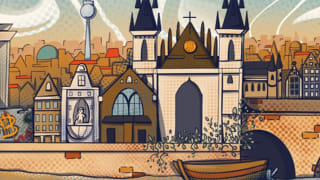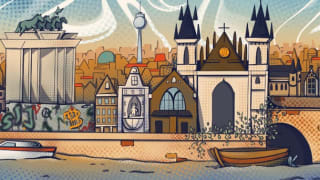In October of 2014, Cointelegraph reported that the city of Arnhem in the Netherlands had become the densest concentration of Bitcoin merchants in the world. And in November, the organizers held a successful six month anniversary event entitled “Arnhem Bitcoin Metropolis,” which attracted nearly 100 people who made over 175 Bitcoin transactions.
First Stop: Bitcoin City
While on vacation in the Netherlands during the holiday break, I decided to bring my bitcoin-filled digital wallet and pay a visit to Arnhem Bitcoinstad, a city with a population of just over 150,000 people, to get an idea of what is actually happening on the ground. My goal was also to rely as little on fiat currency as possible.
I had to pay for the 30-euro roundtrip train ticket from Amsterdam in euros, but the good news was that I withdrew the fiat from a two-way Mr. Bitcoin BTM in Amsterdam. So far so good.
After an hour-long trip by train, I finally arrived in Arnhem, Bitcoin City and arranged to meet one of the organizers of Bitcoinstad, Patrick Van Der Meijde of Bitkassa, a Dutch payment processor.
Naturally, the meeting place was the local Spar supermarket, the first Dutch supermarket to accept Bitcoin, conveniently located right next to the train station.

The Spar supermarket proudly displayed their “Wij accepteren bitcoin” sticker on their front doors, along with a multitude of other payment methods. “Of course you can pay with bitcoins,” said the cashier. So after buying an orange juice and a coffee with bitcoins for the first time in a supermarket, to my excitement, I sat down and waited for Patrick to arrive.
“I believe you just made a payment over here at Spar,” remarked Patrick upon arrival. “Well, it’s in the statistics and the minute you pay for something, it shows up on our website.” (You can check out the stats on the Bitkassa website here). As far as growth is concerned, he added:
“It is still small, but we do see a rise in sales.”
Patrick went on to explain why he is so passionate about Bitcoin, calling it “an alternative to the current financial system and the banks that caused the financial crisis.” He also expects another crisis “within a few years” because “the system has not changed and an alternative will be needed.”
Establishing and fostering a Bitcoin ecosystem in his home city could, in fact, give the local economy the necessary tools to weather yet another crisis that is almost guaranteed by the boom-and-bust cycles inherent in the traditional financial system.
The Challenges of Mainstreaming Bitcoin
Our discussion shifted to the challenges Bitcoin is facing in getting more people onboard. “It’s too technical for most people,” explained Patrick. “It takes them a while to understand how it works and it’s so different than the things they are used to.”
Indeed, I have noticed this when traveling around the Netherlands. The usual reactions from people when I pull out my phone to scan a QR code vary from looking at me as if I’m from another planet, to showing interest and inquiring about Silk Road, Mt. Gox and other juicy headlines they might have encountered in the past year.
“They’re used to something tangible and a government or bank that they can rely on,” he added. When explaining Bitcoin to regular people he told me that he usually tries to make “a connection with email … explaining how there is no director of email or director of the internet.”
The Origins of ‘Bitcoin City’
The challenge of getting more people to use Bitcoin is exactly the reason why the Bitcoin City project was launched. “The first couple of merchants were the hardest to get on board,” said Patrick. He further explained:
“We started it because we live in Arnhem. We thought it was cool if we could pay our expenses ... in bitcoin. And of course it would be nice if other people join us and use bitcoin as well.”
Thus, the typical “chicken or the egg” issue facing Bitcoin was the driving force behind the project. Merchants don’t see the need to accept it if customers do not use it, and customers do not use it, since no merchants accept it. Bitcoin City is attempting to tackle this problem head on by not only onboarding local businesses, but by also giving out paper wallets with a small BTC balance to familiarize people with the technology. They are closely working and exchanging feedback with merchants and customers, and maintaining a constant communication line with local businesses.
“Now if you could just use bitcoins to pay for your utility bills and at a gas station, then you would pretty much have all of your expenses covered,” I said jokingly. Patrick agreed, confirming that’s precisely the goal right now, while also mentioning that he is currently in talks with a local dentist who has shown interest in accepting bitcoins for his services.
In addition, Patrick also described the project’s beginning from a legal standpoint:
“When we started Bitkassa, we got a call from the local tax services and they asked if they could have an appointment. We talked about our plans and we actually educated them about Bitcoin, since it was new to them as well. I found out a lot about Bitcoin and taxes in Holland. Someone at the tax services was also writing a paper about [Bitcoin] and I emailed them the paper of their own colleague and the conclusion was that Bitcoin should be free of VAT.”
At least for now, the Netherlands are leaving cryptocurrencies alone, although its definition as a currency or commodity still occupies a grey area, depending on whom you ask. Patrick cited a general statement by The Netherlands Authority for the Financial Markets (AFM), which says that “according to the law, Bitcoin is not a currency, so it’s not our business.”
Inside Bitcoin City
I used the Bitcoin City map that Patrick gave to me and I went from business to business. One of the most promising aspects that I witnessed was how much of a grassroots movement this project actually is. Patrick seemed to know every single Bitcoin merchant in the city, whose numbers have grown to over 45 in seven months, on a first-name basis.
The merchants who are already accepting Bitcoin are increasingly recommending other businesses who would possibly be open to using the cryptocurrency. “That’s how I got more merchants,” he explained. “The first ones were the hardest.”
Cafe Njoy was the first business to accept Bitcoin in the city, and neighbors of the cafe actually recommended it when they were hesitant to accept it themselves. Over time, it has become easier to sign up more businesses. Positive press coverage allows Patrick to reference such articles when talking to local merchants who might otherwise be ambivalent or reluctant to accept a currency that mass media often stigmatizes and associates with illegal activities.
Slijterij van Pernis was another business among the first to sign up. Patrick told me that the owner explained why he chose to accept Bitcoin:
“I can tell you more about beer than about Bitcoin, but I got more customers as a result and it doesn’t cost me anything, so it’s ok with me.”

Unfortunately, I did not have the time to visit every bitcoin business, but one of my first stops was a sandwich shop, popular among students, called Mo Lón Sandwiches. “Their POS tablet was stolen,” said Patrick, “so now they just flash the QR code on the big screen near the counter.”

This wasn’t a problem. I simply scanned the code on the screen and paid for our meal (which tasted amazing by the way) in a matter of seconds.
Frank, the owner, later told me that he sees about three customers per week paying with bitcoins, and admitted that it has not been growing as fast as he had hoped. However, offering an additional payment option for his customers at no additional (and even lower cost compared to credit cards) to him was a no-brainer.
For the sake of brevity, I will not delve into every other transaction I made in Arnhem, as I had no problem paying with bitcoin at any of the locations on the map. Some of the other spots I visited included:

Every reaction in Arnhem I received from owners when opting to pay in bitcoin was very positive. Every time I asked about the paying with BTC, the reply was always:
“Oh, so you want to pay with the bitcoin, great!”
However, a few times, I did encounter some staff members who were not yet familiar with how to use the POS tablet (although this problem was more common in Amsterdam, which I will cover later). Nevertheless, this wasn’t a major hurdle, as I demonstrated how simple it was to use their Bitkassa terminals to enter the amount in euros and bring up the QR code on the screen.
Closing Thoughts
One of the most exciting takeaways from my experience was the fact that some Bitcoin-accepting merchants are “in talks” about conducting business between each other using bitcoins. For example, a cafe could buy their organic coffee from a local eco-supermarket and remove fiat currencies from the equation altogether.
A major boost to Bitcoin adoption could come as a result of local businesses not only simply accepting bitcoins, but also conducting their B2B transactions in cryptocurrency. On the supplier side, if local coffee producers in Ethiopia, for example, also use bitcoins, then middle-man fees could be significantly reduced across the entire supply chain, reducing costs for producers to consumers.
If you’re looking to get the most out of your bitcoins offline, then Arnhem Bitcoin City is probably your best shot right now. There is also a hotel accepting bitcoins, as well as a massage therapist, a postal service, a hair salon, and even a tire repair shop.
With the Bitcoin City project setting its sights on museums, cinemas, expositions and libraries, all of your needs will soon be covered and payable with bitcoins. Perhaps the boost to the fledgling ecosystem might come not from bitcoin enthusiasts, but from the sputtering global financial system itself.
Since almost everyone agrees that it’s not a question of if but when—when the next financial crisis hits—Arnhem, will already have the infrastructure in place to wean itself from the traditional banking system and ride out the storm better than other municipalities.
Full disclosure: I paid 50 cents in fiat, twice, to use the restroom in Arnhem Central station.

Did you enjoy this article? You may also be interested in reading these ones:
- ‘Bitcoin City’ Arnhem Becomes Densest Concentration of BTC Merchants in the World
- Arnhem Bitcoincity Seeking Government Support to Enroll Museums, Libraries and More
- Amsterdam Aims to Become Bitcoin Capital of the World











